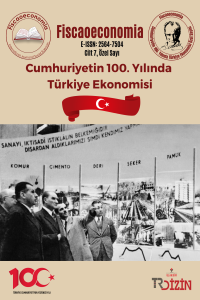Agroekolojik Bakış Açısından Türkiye’de Tarımsal Sürdürülebilirlik
Agricultural Sustainability in Turkey from an Agroecological Perspective
Author(s): Onur Yeni, Özgür TeomanSubject(s): Agriculture, Energy and Environmental Studies, Economic policy
Published by: Ahmet Arif Eren
Keywords: Agricultural Sustainability; Agroecology; Food Security; Farmer Incomes; Agricultural Input Use;
Summary/Abstract: This study aims to evaluate the status of agricultural sustainability in Turkey from an agroecological perspective in the post-2000 period. Agroecology offers an alternative approach to the various environmental and socioeconomic problems caused by modern industrial agricultural systems, prioritizing the participation of all stakeholders in the production process. In this context, agroecological objectives include reducing chemical input usage, conserving biodiversity and soil, facilitating the flow of knowledge, skills, and technology among agricultural producers, especially among small-scale farmers, and creating a social solidarity economy between rural and urban areas. The period under consideration in the study coincides with the dominance of neoliberal policies in the agricultural sector in Turkey and the observed effects of these policies. These effects have simultaneously emerged in agricultural input and product markets. The welfare impacts of this transformation have favored large-scale national agricultural enterprises and multinational corporations, while small and medium-sized enterprises have been adversely affected. During this period, some small family-run farms unable to adapt have exited agriculture, and a significant amount of agricultural land has remained unused, accelerating rural-to-urban migration. In assessing agricultural sustainability, we use a descriptive analysis method, taking into account the environmental, social, and economic dimensions as outlined in the relevant literature. The environmental dimension considered natural resource and input use trends as well as greenhouse gas emissions, while as indicators of the social and economic dimensions, we use food security and farmer incomes, respectively. The findings of the study indicate that there are various problems in Turkey concerning all three dimensions evaluated, and agricultural sustainability is declining. While policymakers, producers, and consumers in Turkey have the potential to contribute to agricultural sustainability through synchronized decision-making and collective action, there are significant structural, socioeconomic, and political challenges ahead for agroecological transformation.
Journal: Fiscaoeconomia
- Issue Year: 7/2023
- Issue No: spec. 1
- Page Range: 120-151
- Page Count: 32
- Language: Turkish

